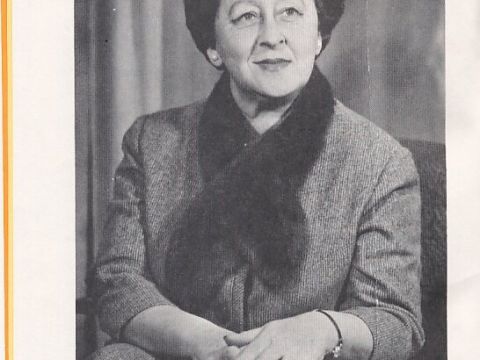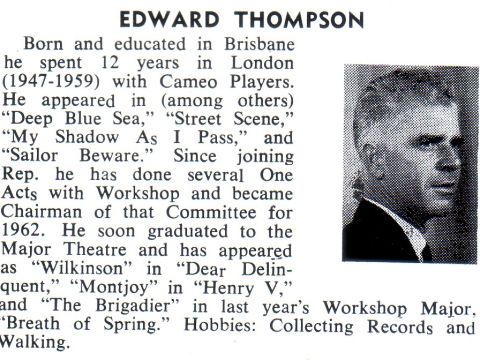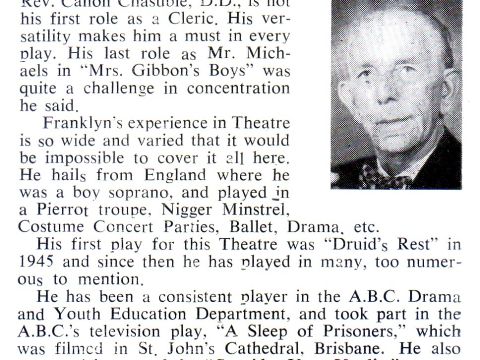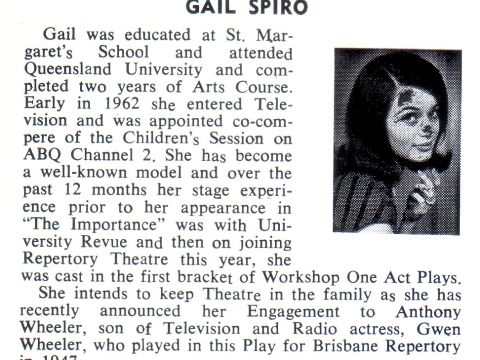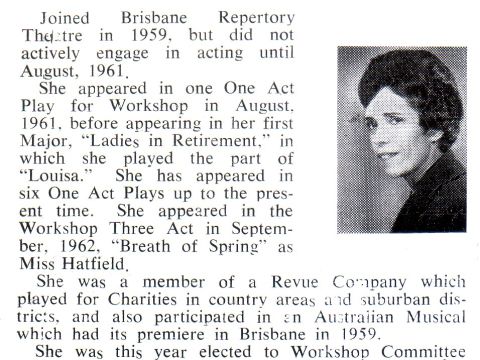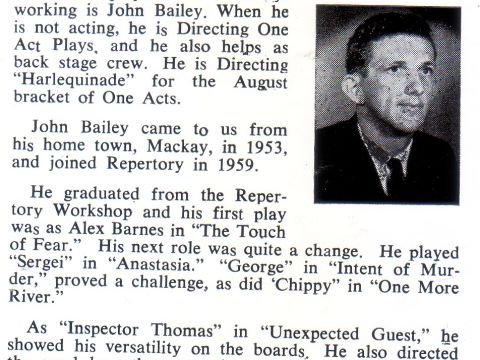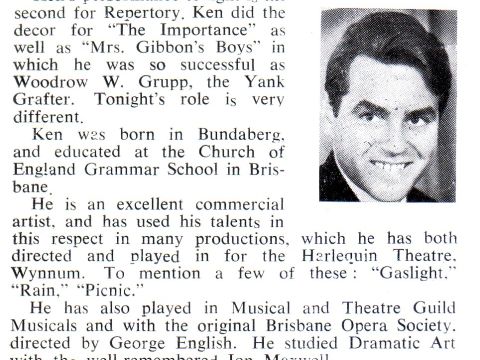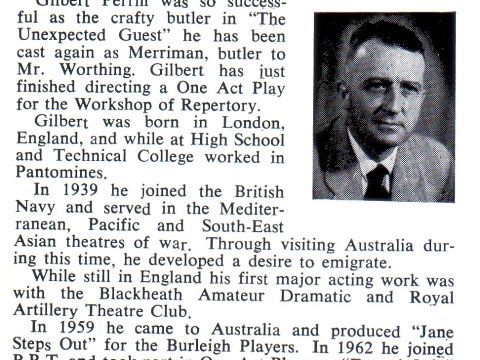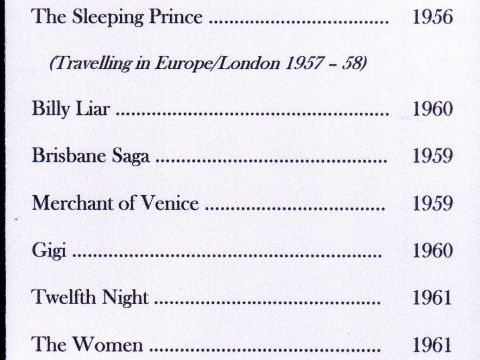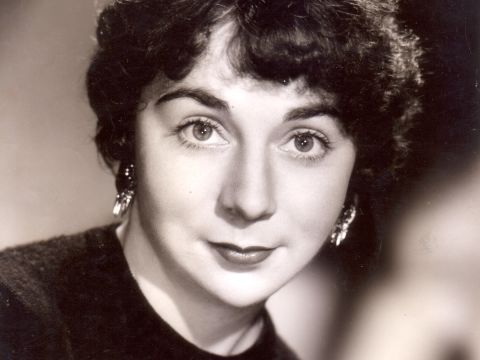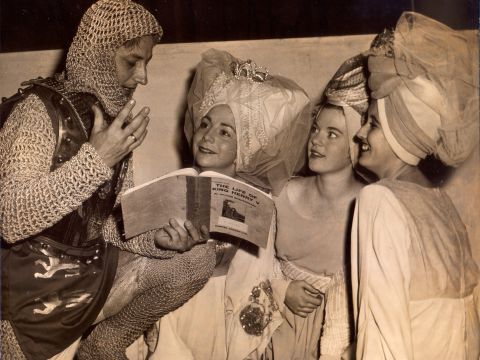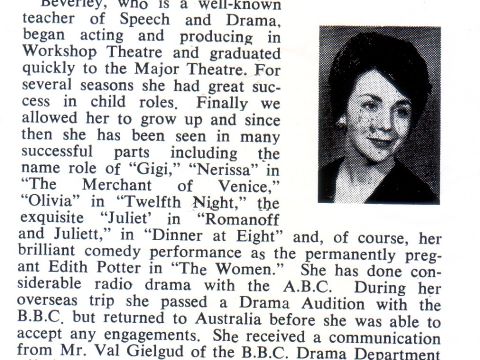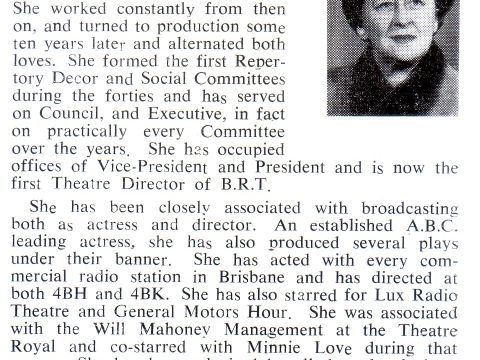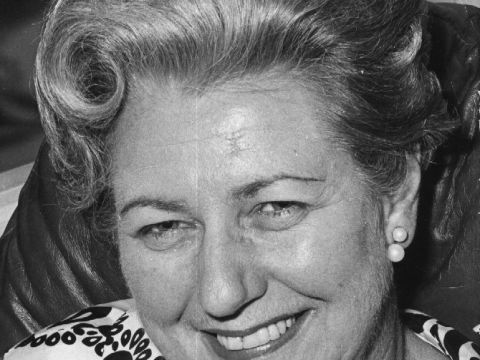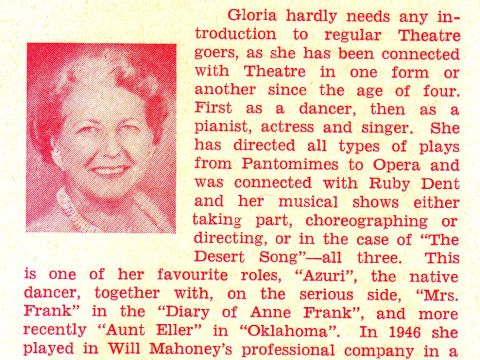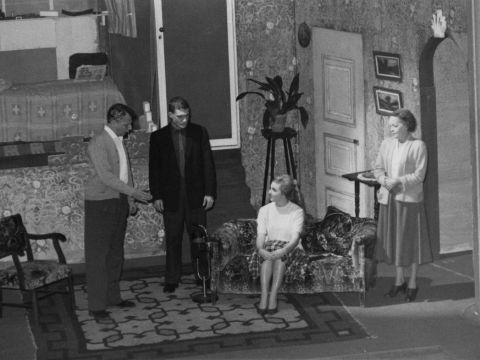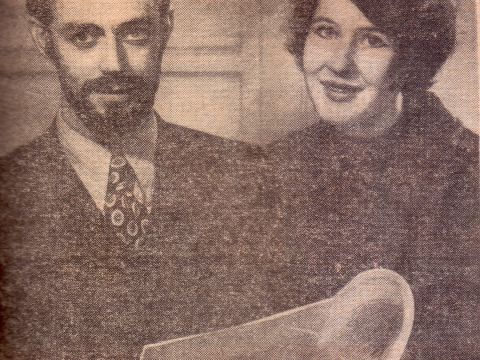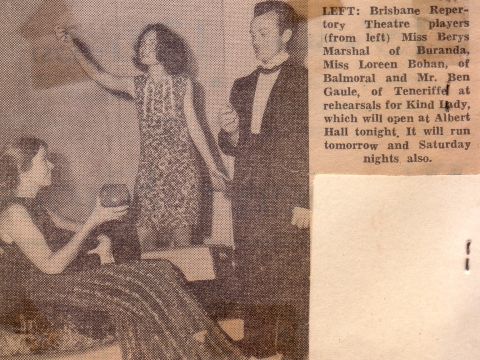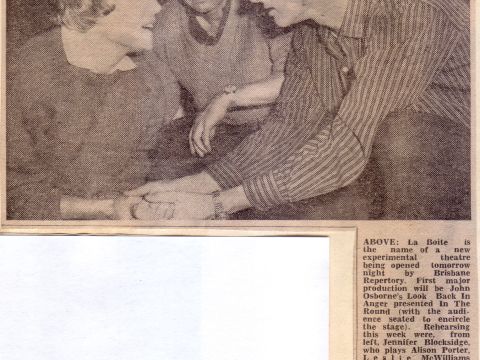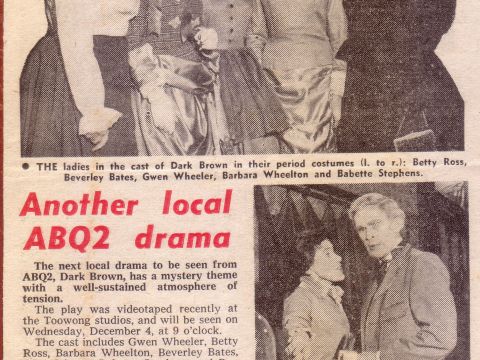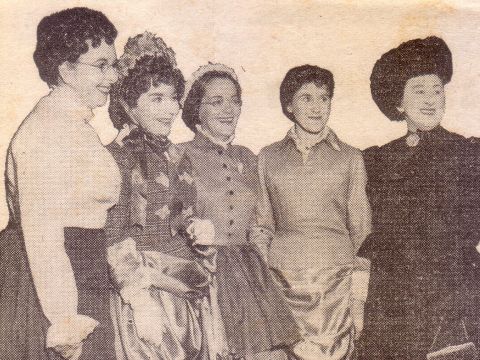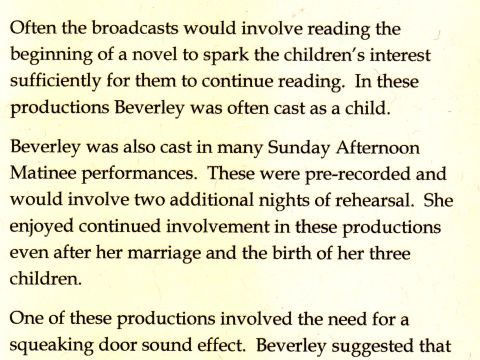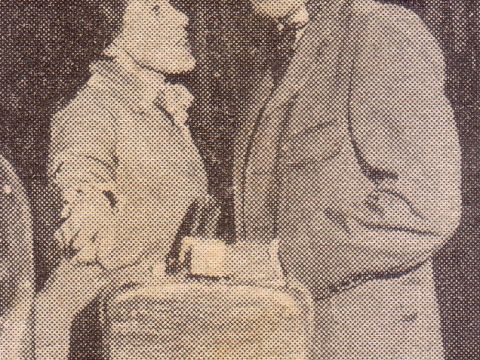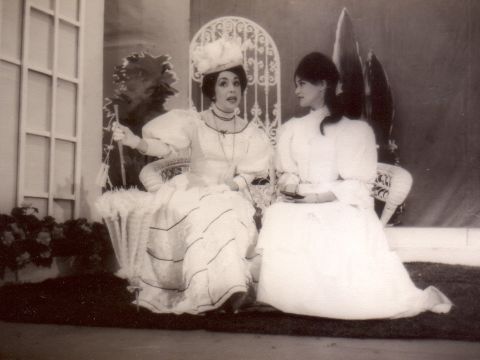Our History
Box-Office Success
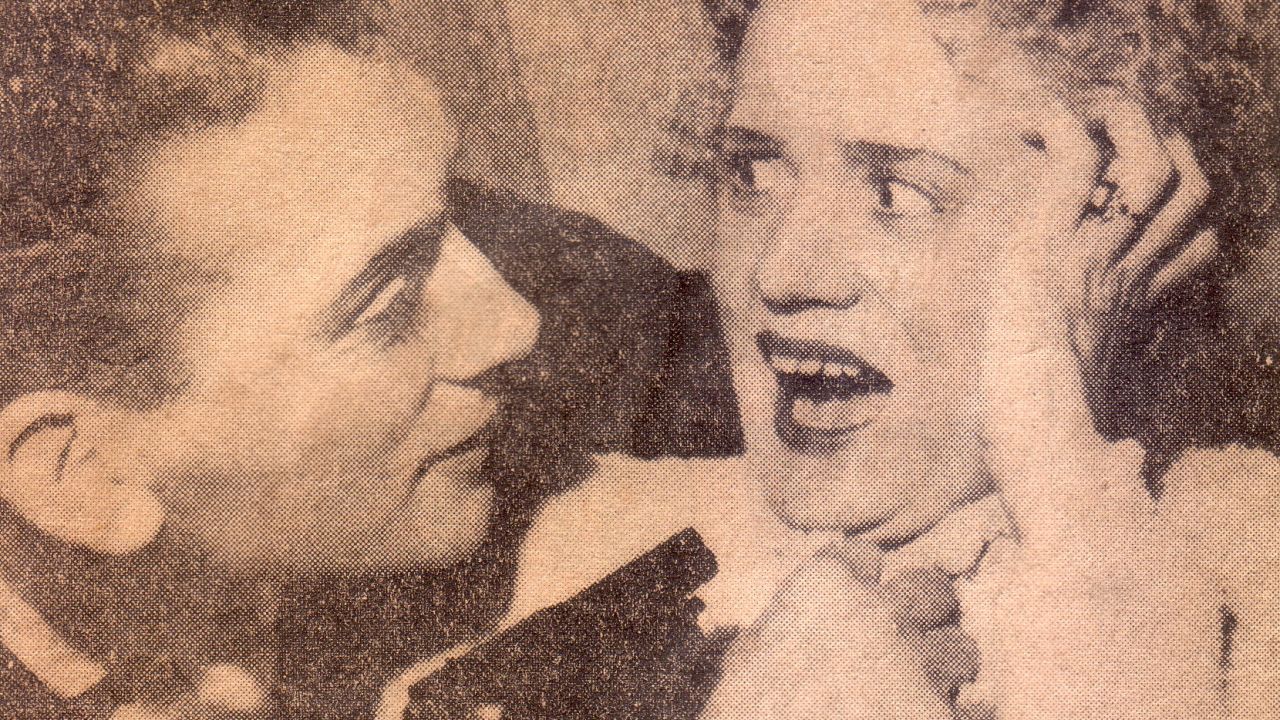
Ian Mitchell & Tina Flor in The Unexpected Guest directed by Gloria Birdwood-Smith, 1963.
Courtesy Rikki Burke.
In 1960, the Repertory Council, not wishing to lose Babette Stephens’ valuable presence and influence after her three year term as its President, created a new position for her, that of Theatre Director with an accompanying annual fee of £250. The attachment of a fee for directing was not new – in Sisley’s day, she and others earned up to £20 per production – but the innovation was the formalising of the role with its own title and annual fee.
As she chose to interpret it, the position of Theatre Director went far beyond artistic matters and for the next eight years she dominated all aspects of Repertory’s artistic and organisational life to the point where the role of Council President was in danger of becoming a figure-head position.
The plays that she chose as Theatre Director were mainly contemporary American or British plays – dramas, thrillers, comedies, romances and often ones that had been Broadway or West End hits – that would draw a Brisbane audience and have high entertainment value. It was Stephens’ talent for choosing well crafted, audience-pleasing works, which were achievable within the many constraints posed by an amateur organisation,that kept Brisbane Repertory’s reputation high and the organisation artistically successful during her long association. The Australian play ‘drought’ was finally broken in 1962 with a highly successful season of Alan Seymour’s The One Day of the Year. Directed by Stephens, it did such “remarkable business”[i] that Stephens would have extended the season except for the unavailability of Albert Hall.
The directorial partnership that Stephens had established in the 1950s with Gloria Birdwood-Smith continued into the mid-sixties. Between them they directed an extraordinary 50 of the 56 mainhouse productions in the ten year period to 1965. This was a deliberate move by Stephens to ‘quality control’ Brisbane Repertory productions and to develop a ‘house style’ – and it worked.
A consequence of this policy was an apprentice actor training model made available to young actors as Workshop Theatre under the guidance of these two experienced directors. Between 1957 and her final year as Theatre Director, Workshop produced 65 one act plays and ten three act plays.[ii]
By 1960 Stephens and Birdwood-Smith had contributed to the fostering of such outstanding young talent that the next move for some of these performers should logically be into the professional theatre. Barry Otto, for example, was introduced to acting at Repertory, performing in Workshop plays before graduating to leading roles in mainstage productions. By the early 1970s his professional career in southern States had taken off in television and stage and the rest, as they say, is history!
With no opportunities available locally, Barry Creyton, who had had lead roles in Stephens’ 1960 productions of Nude with Violin and Twelfth Night left Brisbane to join J.C.Williamson and subsequently The Mavis Bramston Show. Elaine Cusick was accepted into the first intake of students for the newly formed National Institute of Dramatic Art (NIDA) and Judith Arthy’s professional career took off with a role in The One Day of The Year in Sydney.
Ray Barrett, who performed in Repertory plays from the early 1950s, found recognition in Australian radio before heading to London where he played lead roles in a number of British TV series. Nonie Stewart opened in New York to enthusiastic press reports for her role as Mary Stuart in My Beginning. Timothy Cohen and Rosalind Seagrave, who had performed lead roles in Birdwood-Smith’s 1960 productions Touch of Fear and Affairs of State respectively, joined the Elizabethan Trust School in 1961 and the following year were accepted into NIDA.
In a gesture that reflected the pride Stephens and the Council had in these young people, Rosalind Seagrave was awarded a Brisbane Repertory Theatre Scholarship which paid her NIDA fees for 1962. Seagrave graduated from NIDA with honours and went immediately into her first professional production in Sydney, playing the lead role in Lady Audley’s Secret.
These individual successes were a boost to Brisbane Repertory Theatre’s reputation as a ‘training ground’ not only for actors but for all aspects of theatre work, a function that continued until it became a professional company in 1993.
But another problem was looming. While Stephens’ play seasons regularly delivered box office successes and membership increases, Repertory was increasingly frustrated by not being able to capitalise on its success. For example, the 1961 seasons (which also included tours of Twelfth Night to Warwick and Toowomba) did remarkable business and the two big hits of the year, The Women and See How They Run, could easily have had extended seasons if only Repertory had its own theatre.
To this point, Stephens had never contemplated producing a mainhouse play in one of the cottages Repertory owned. However, all that changed when Repertory member Rikki Burke conducted an experiment in the Hale Street rehearsal cottage. She directed a workshop production in ‘the round’ of Moon on the Hill with actors Jennifer Blocksidge, Barry Otto, Hazel Howson and Edward Thompson. It was a success. In her 1965 Report, Stephens commented: “This was so successful that it is to be hoped that many more such nights may be made possible. This rehearsal room lends itself extremely well to this kind of production”.
These were revealing and fateful words, but it would take two more years before anyone would think of using Repertory’s properties for anything apart from workshop productions, club rooms, rehearsal spaces, storage and production needs.
Read the article on The First La Boite Theatre to find out what happened next!
Writer: Christine Comans
#Gallery
#Have any photos to share?
We'd love to see your photos and publish them in our archive.
#Tell us your story
Does this article bring back some memories?
